Dara Domhnach den Cháisc (english version at end
CÉAD LÉACHT
Sliocht as an Leabhar Gníomhartha na nAspal 2:42-47
Agus an méid a chreid, bhídís i bhfochair a chéile, agus bhíodh gach ulle núí I gcomhar acu.
Chloígh na bráithre seasmach le teagasc na n-aspal, le comaoin ar a chéile, le briseadh an aráin agus leis na hurnaithe.
Is iomaí míorúilt agus éacht a bhí á dhéanamh ag na haspail, rud a chuir uamhan ar chách.
Bhí na creidmhigh go léir in aon bhuíon le chéile agus bhí gach ní i bpáirt acu; dhíolaidís a gcuid sealúchais agus a gcuid maoine agus roinnidís a luach ar chách de réir mar a bhíodh aon duine acu ar an gcaolchuid.
Thagaidís le chéile in aon bhuíon sa Teampall gach lá ach bhrisidís arán i dtithe a chéile agus chaithidís a gcuid le chéile lemóráthas agus le sástacht chroí agus iad ag moladh Dé. Agus bhí gnaoi an phobail orthu. Agus ó lá go lá bhí an Tiarna ag cur le líon na ndaoine a bhí ar bhealach a slánaithe.
Salm le Freagra Sm 117
Freagra Is é seo an lá a rinne an Tiarna, Bíodh áthas is gliondar orainn. Alleluia
1 Tugaigí buíochas don Tiarna toisc gur mhaith é
Oír maireann a ghrádh de shíor
Bíodh Taighleach Israél dá rá
Maireann an ghrádh de shíor
Freagra
- Teilgeadh síos mé i dtreo is go dtitfinn,
ach chuidigh an Tiarna liom.
Is é an Tiarna mo neart is mo mhisneach:
is é a thug slán mé.
Freagra - An chloch dár dhiúltaigh na saoir,
rinne ceann an chúinne di.
Is é an Tiarna a rinne é seo,
agus is éachtach linne é.
Freagra
DARA LÉACHT
Sliocht as céad Litir Naomh Peadar 1:3-9
D ‘athghin sé sinn trí aiséirI losa Críost ó mhairbh, ionas go mbeadh beomhuinín againn.
Moladh le Dia agus Athair ár dTiarna Íosa Críost! D’athghin sé sinn as ucht a mhórthrócaire, trí aiséirí Íosa Críost ó mhairbh, chun bheomhuiníne agus chun oidhreachta atá marthanach dothruaillithe, gan síothlú, oidhreacht atá in áirithe daoibh sna flaithis. Tá sibh anois do bhur gcumhdach tríd an gcreideamh ag Dia na bhfeart, le haghaidh an tslánaithe atá réidh lena fhoilsiú ag deireadh ré. Is údar lúcháire agaibhse é seo, fiú más dobrónach féin sibh ar feadh tamaill bhig de bharr trialacha den uile chineál, d’fhonn go bhfaighfí fíormhianach bhur gcreidimh, atá níos luachmhaire ná ór – rud atá somhillte cé go dtástáiltear sa tine é – ag dul chun molta agus onóra agus glóire tráth a fhoilseofar Íosa Críost. Ní fhaca sibh é, ach tugann sibh grá dó; ní fheiceann sibh anois féin é, ach creideann sibh ann, agus is lúcháireach sibh le háthas glórmhar dolabhartha, agus slánú bhur n-anam á ghnóthú agaibh mar thoradh ar bhur gcreideamh.
Alleluia:
Alleluia, Alleluia, Ó Alleluia. Críost aiseirithe, Alleluia, Críost aiseirithe. Alleluia.
SOISCÉAL
Sliocht as Soiscéal naofa de réir Naomh Eoin 20:19-31
Tráthnóna an lae chéanna, an chéad lá den tseachtain, tháinig Íosa.
Tráthnóna an lae chéanna, an chéad lá den tseachtain, agus na doirse faoi ghlas le
heagla na nGiúdach, san áit ina raibh na deisceabail, tháinig Íosa agus sheas ina measc agus dúirt leo:
“Síocháin daoibh!”
Á rá sin dó, thaispeáin sé dóibh a lámha agus a chliathán. Bhí áthas ar na deisceabail nuair a chonaic siad an Tiarna. Dúirt Íosa leo ansin arís:
“Síocháin daoibh!
Amhail mar a chuir an tAthair uaidh mise, táimse do bhur gcursa uaim freisin.”
Arna rá sin dó, d’análaigh sé orthu agus dúirt leo:
“Glacaigí an Spiorad Naomh.
Na daoine a maithfidh sibh a bpeacaí dóibh, beidh siad maite dóibh;
na daoine a gcoinneoidh sibh a bpeacaí, beidh a bpeacaí coinnithe.”
Tomás, duine den dáréag ar a dtugtaí an Leathchúpla, ní raibh sé leo nuair a tháinig Íosa. Dúirt na deisceabail eile leis: “Chonaiceamar an Tiarna.” Ach dúirt seisean leo: “Mura bhfeicfidh mé rian na dtairní ar a dhearnana, agus mo mhéar a chur i bpoll na dtairní, agus mo lámh ina chliathán, ní chreidfidh mé.” Ocht lá ina dhiaidh sin, bhí a dheisceabail istigh arís, agus Tomás in éineacht leo. Tháinig Íosa agus na doirse faoi ghlas, sheas sé ina measc agus dúirt: “Síocháin daoibh!” Ansin dúirt sé le Tomás: “Tabhair i leith do mhéar agus féach mo dhearnana, sín amach do lámh agus cuir i mo chliathán í, agus ná bí díchreidmheach ach creidmheach.” D’fhreagair Tomás: “Mo Thiarna agus mo Dhia!”Dúirt Íosa leis:
“De bhrí go bhfaca tú mé, a Thomáis, chreid tú. Is méanar dóibh seo nach bhfaca agus a chreid.”
Bhí go leor fearta eile fós a rinne Íosa os comhair a dheisceabal, agus níl aon chur síos orthu sa leabhar seo. Ach cuireadh an méid sin i scríbhinn chun go gcreidfeadh sibh gurb é Íosa an Criost, Mac Dé, agus á chreidiúint go mbeadh an bheatha agaibh ina ainm.
Soiscéal Dé
Béarla/English version
Reading 1 Acts 2:42-47
They devoted themselves
to the teaching of the apostles and to the communal life,
to the breaking of bread and to the prayers.
Awe came upon everyone,
and many wonders and signs were done through the apostles.
All who believed were together and had all things in common;
they would sell their property and possessions
and divide them among all according to each one’s need.
Every day they devoted themselves
to meeting together in the temple area
and to breaking bread in their homes.
They ate their meals with exultation and sincerity of heart,
praising God and enjoying favor with all the people.
And every day the Lord added to their number those who were being saved.
Responsorial Psalm Ps 118:2-4, 13-15, 22-24
- (1) Give thanks to the LORD, for he is good, his love is everlasting.
or:
R. Alleluia.
Let the house of Israel say,
“His mercy endures forever.”
Let the house of Aaron say,
“His mercy endures forever.”
Let those who fear the LORD say,
“His mercy endures forever.”
R. Give thanks to the LORD, for he is good, his love is everlasting.
or:
R. Alleluia.
I was hard pressed and was falling,
but the LORD helped me.
My strength and my courage is the LORD,
and he has been my savior.
The joyful shout of victory
in the tents of the just:
R. Give thanks to the LORD, for he is good, his love is everlasting.
or:
R. Alleluia.
The stone which the builders rejected
has become the cornerstone.
By the LORD has this been done;
it is wonderful in our eyes.
This is the day the LORD has made;
let us be glad and rejoice in it.
R. Give thanks to the LORD, for he is good, his love is everlasting.
or:
R. Alleluia.
Reading 2 1 Pt 1:3-9
Blessed be the God and Father of our Lord Jesus Christ,
who in his great mercy gave us a new birth to a living hope
through the resurrection of Jesus Christ from the dead,
to an inheritance that is imperishable, undefiled, and unfading,
kept in heaven for you
who by the power of God are safeguarded through faith,
to a salvation that is ready to be revealed in the final time.
In this you rejoice, although now for a little while
you may have to suffer through various trials,
so that the genuineness of your faith,
more precious than gold that is perishable even though tested by fire,
may prove to be for praise, glory, and honor
at the revelation of Jesus Christ.
Although you have not seen him you love him;
even though you do not see him now yet believe in him,
you rejoice with an indescribable and glorious joy,
as you attain the goal of your faith, the salvation of your souls.
Alleluia Jn 20:29
- Alleluia, alleluia.
You believe in me, Thomas, because you have seen me, says the Lord;
blessed are they who have not seen me, but still believe!
R. Alleluia, alleluia.
Gospel Jn 20:19-31
On the evening of that first day of the week,
when the doors were locked, where the disciples were,
for fear of the Jews,
Jesus came and stood in their midst
and said to them, “Peace be with you.”
When he had said this, he showed them his hands and his side.
The disciples rejoiced when they saw the Lord.
Jesus said to them again, “Peace be with you.
As the Father has sent me, so I send you.”
And when he had said this, he breathed on them and said to them,
“Receive the Holy Spirit.
Whose sins you forgive are forgiven them,
and whose sins you retain are retained.”
Thomas, called Didymus, one of the Twelve,
was not with them when Jesus came.
So the other disciples said to him, “We have seen the Lord.”
But he said to them,
“Unless I see the mark of the nails in his hands
and put my finger into the nailmarks
and put my hand into his side, I will not believe.”
Now a week later his disciples were again inside
and Thomas was with them.
Jesus came, although the doors were locked,
and stood in their midst and said, “Peace be with you.”
Then he said to Thomas, “Put your finger here and see my hands,
and bring your hand and put it into my side,
and do not be unbelieving, but believe.”
Thomas answered and said to him, “My Lord and my God!”
Jesus said to him, “Have you come to believe because you have seen me?
Blessed are those who have not seen and have believed.”
Now, Jesus did many other signs in the presence of his disciples
that are not written in this book.
But these are written that you may come to believe
that Jesus is the Christ, the Son of God,
and that through this belief you may have life in his name.

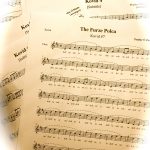
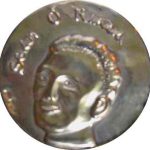
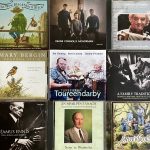

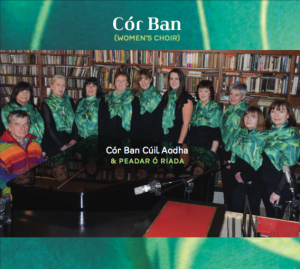
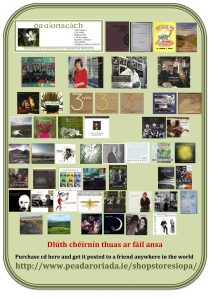
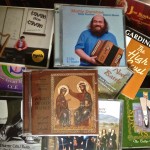
Déan Nasc / Get Connected!